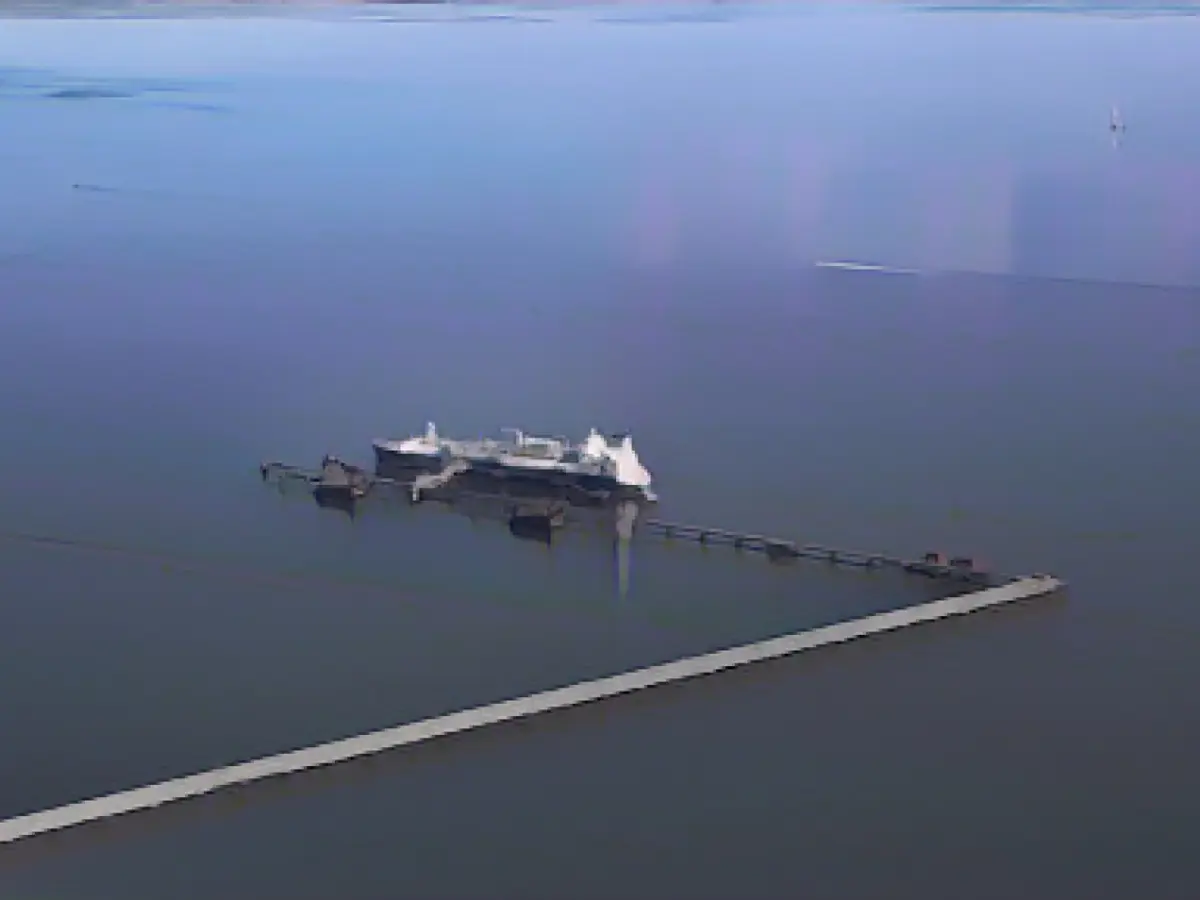Liquefied natural gas - Pipeline for LNG ready: "Building block for energy security"
With a final weld seam, another 70-kilometer-long connecting pipeline for the LNG terminal in Wilhelmshaven has been technically completed. After around nine months of construction, the last, so-called golden seam was produced on a construction site near Westerstede in Ammerland, as the energy supplier EWE announced on Thursday. The pipeline is due to go into operation from the beginning of 2024 and will transport landed liquefied natural gas (LNG ) that has been converted back into gas to gas storage facilities in the district of Leer and into the long-distance gas network. The underground pipeline has a capacity of six billion cubic meters per year - enough to supply around four million households with energy, according to EWE.
For around a year now, LNG has been landed in Wilhelmshaven via the first floating import terminal. It is converted back into a gaseous state on the special ship "Höegh Esperanza" and fed into the gas grid. The gas grid operator Open Grid Europe (OGE) had already built an initial connection pipeline for this last year. The Wilhelmshaven-Leer pipeline built by EWE near Sande now connects to this pipeline and runs through the three districts of Friesland, Ammerland and Leer to the gas storage facilities on the Ems.
New pipeline to contribute to energy security
The amount of LNG landed at the Jade is soon to increase. This is because a second floating LNG terminal is to be launched in Wilhelmshaven in the coming months. According to EWE, this will also require more transport capacity.
With the completion of the new pipeline, Lower Saxony is strengthening its position as a "hub for energy for the whole of Germany", said Economics Minister Olaf Lies (SPD) on the occasion of the final seam. "The new pipeline is not only an essential building block for Germany's energy security, but also for a sustainable, resilient and affordable energy supply in the long term. We absolutely need this for the success of the transformation of our economy."
In the future, the pipeline should also be able to transport green hydrogen instead of natural gas - according to EWE, the pipeline is designed for this. It could be ready by 2027, they say. However, the large hydrogen production plants, which are also planned in Wilhelmshaven, are still missing. Green hydrogen produced using renewable energy is intended to make a significant contribution to climate protection.
Pipeline consists of more than 4000 pipes
In total, around 4,200 pipes with a diameter of around 60 centimetres have been laid and around 5,000 welds made for the new pipeline since the official start of construction at the beginning of March this year. The pipes were first welded together above ground along the route and then laid in an excavated trench. According to EWE, the company invested around 200 million euros.
According to the company, the project was completed in "record time". Chief Technical Officer Urban Keussen said that hard work had continued right up to the end to complete the pipe construction work. "We can proudly say that we have kept our promise to complete the pipeline by the end of the year."
According to EWE, the technical acceptance of the gas pipeline has also already taken place. This means that the pipeline is ready to transport gas. Trial operations are due to begin shortly. It is expected to officially go into operation at the beginning of 2024.
Next pipeline construction already in planning
However, the pipeline expansion in the northwest is not yet over with the new EWE pipeline. The first section of another pipeline, around 60 kilometers long, is to be built from 2024 from the natural gas storage facilities in Etzel in the district of Wittmund to a compressor station in Wardenburg south of Oldenburg. The gas network operator Open Grid Europe recently announced that the existing pipeline network in the north-west is already "almost at full capacity" due to the transportation of natural gas from Norway and the Netherlands.
EWE website on the new pipeline OGE information on the Etzel-Wardenburg pipeline project
Read also:
- A clan member is punished here
- Traffic lawyer warns: Don't talk to the police!
- Will he be convicted as Jutta's murderer after 37 years?
- He also wanted to kill his cousin
- The new pipeline, once operational in 2024, will transport landed LNG back into gas, providing sufficient energy for around four million households, as stated by EWE.
- The pipeline, with a capacity of six billion cubic meters per year, will transport gas from the LNG terminal in Wilhelmshaven to gas storage facilities in Leer and the long-distance gas network.
- EWE has announced that the finished pipeline, near Westerstede in Ammerland, will connect to the initial connection pipeline built by Open Grid Europe (OGE) last year, creating a network that runs through Friesland, Ammerland, and Leer.
- Wilhelmshaven, located in the County of Friesland, has been receiving LNG via the first floating import terminal for over a year.
- The completion of the new pipeline will contribute to Germany's energy security, as well as supporting a sustainable, resilient, and affordable energy supply in the long term, according to Lower Saxony's Economics Minister Olaf Lies.
- In the future, the pipeline could potentially transport green hydrogen instead of natural gas, and if the necessary hydrogen production plants are established, it could become operational by 2027.
- Another pipeline expansion, estimated to be around 60 kilometers long, is planned for 2024, connecting natural gas storage facilities in Wittmund to a compressor station in Wardenburg south of Oldenburg, relieving the current pipeline network in the northwest that is almost at full capacity.
Source: www.stern.de








